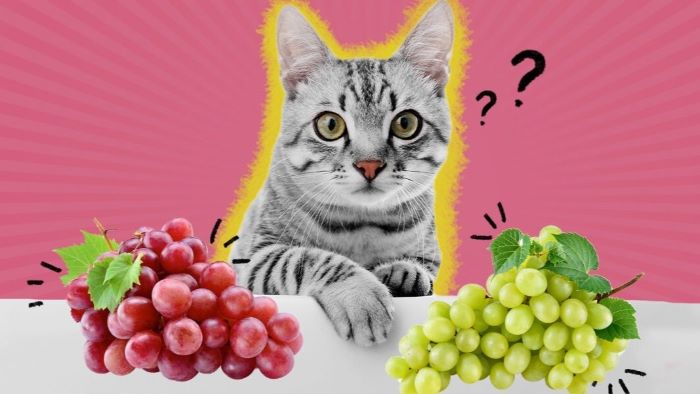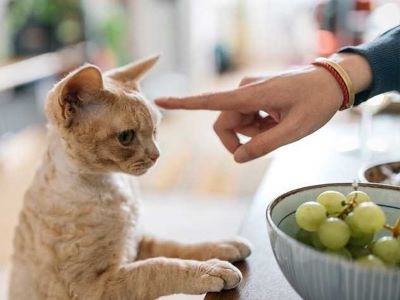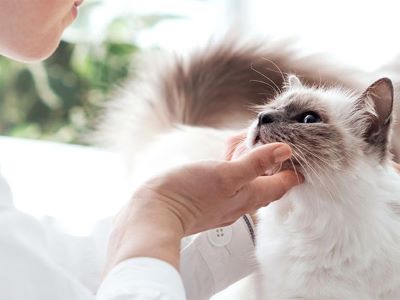Some of the most toxic food for cats are onion, garlic, raw eggs & meat, chocolate, grapes and raisins.
You might have heard that it is harmful for dogs to eat grapes, right? You might be wondering if cats can eat grapes as well. Fortunately, most of the cats aren’t interested in eating sugary fruits.
But the question arises if cats can eat grapes that falls on the floor, or kept somewhere in the kitchen outside the refrigerator.
Here’s is what you are curious to know about cats and grapes.
Are Grapes safe for cats?
Scientists are yet to find the reason why grapes are not suitable for our furry friends. But, in most of the occurrences, cats that had eaten grapes showed signs of toxicity by showing restlessness, a reduced appetite, and having begun to vomit.

Moreover, it is reported that cats have suffered gastrointestinal problems and some serious issues such as kidney failure after ingesting grapes.
According to Dr. Black at Texas A&M University, grapes and raisins can be particularly dangerous to cats and dogs. “These foods may not necessarily cause toxic reactions in every case of ingestion, but it’s just a good ‘rule of thumb’ to keep these items off your kitchen counters and under no circumstances feed these foods to your pet.”
The current understanding is that it is a water-soluble compound in grape fresh. While some evidence show that tartaric acid is probably the cause, and it is found in different concentrations in grapes.
What Should I Do If My Cat Eats Grapes?
It is better to connect with a veterinarian (or an emergency clinic) immediately to be on the safe side if your cat has eaten grapes or even a single grape because, although it is rare, the consequences of acute kidney-related problems or diseases are extremely concerning.

It is highly recommended not to induce vomiting unless the veterinarian has recommended. Instead, bring your cat immediately to the nearest veterinary hospital for further treatment.
Signs of Grape Poisoning in cats
Within 12-24 hours of consumption of grapes, the following initial signs can be seen.

- Weakness
- Vomiting
- Indigestion
- Reduced appetite
- Dehydration
- Rapid breathing
- Abdominal pain
48 hours after ingestion, more dramatic signs of kidney disease can be seen
- Excessive thirst and urination
- Severe vomiting
- No appetite
- No urination
- Abdominal pain
- Coma
Some kidney damage within first 12 hours may still be preventable, but once the damage occurs, it is not fully reversible. So, it is necessary that cats should be treated right away after ingestion.
How Can We Stop Cats From Eating Grapes?
It is not necessary if your cat is not allowed to eat grapes then you should give up eating it too. Here are few tricks that may help you.

- At first, you should not feed your cat grapes on purpose.
- If you drop grapes on floor, make sure that you pick up the grape right away.
- It’s best not to leave grapes on the kitchen table or somewhere if you have a curious cat. Instead, you can store them in the fridge or in a cupboard which cat cannot open.
- Make sure you don’t leave you grocery shopping bags easily approachable for your cat after shopping.
How Vets Treat Grape Toxicity in Cats?

Most of the veterinarians do physical examination of the cat that has eaten grapes, take note of their discomfort or signs around kidney area particularly. Comparisons of blood and urine samples are also performed for next few hours and days. Animal Poison control maybe consulted too.
In most cases, vets try to flush the bloodstream and kidneys using IV fluids[1], which keeps the urine flow high. This helps to protect kidneys from toxins. Moreover, cat’s intestinal path is also cleaned by causing the cat to vomit and by using binding agents to absorb toxins.
FAQs
What should I do if my cat ate a grape?
It is better to connect with a veterinarian (or an emergency clinic) immediately to be on the safe side if your cat has eaten grapes or even a single grape because, although it is rare, the consequences of acute kidney-related problems or diseases are extremely concerning.
Is it OK if a cat eats a grape?
It is absolutely unsafe for cats to eat even a single grape. The reason behind the toxicity of the grapes has yet to be discovered by the scientists. It has been reported that the cats who ingested grapes suffered serious health issues like permanent kidney failure.
Can I give my cat grape juice?
You should absolutely avoid giving your cat any foods or drinks containing grapes or resin. The reason why grapes are not suitable for cats has yet to be discovered.
How do I know if my cat ate grapes?
Signs you may observe in your cat after grape ingestion include:
- Vomiting
- Stomach pain
- Reduced appetite
- Drinking more water than usual
- Indigestion
- Weakness
- Rapid breathing
- Dehydration
Conclusion
Although it is extremely rare for cats to eat grapes and get ill from them, if your cat ingests grapes, it is highly recommended to call and consult a vet immediately, as it could be fatal for their health and kidneys in particular. Overlooking this can lead to severe damage to their kidneys.
So, it is our responsibility to take care of them and keep grapes and other unsuitable items out of the reach of cats.
References:
- Caseyl. (2023, December 5). Considerations for creating a fluid therapy plan – Veterinary Medicine at Illinois.

Brenda Castillo is a volunteer groomer of a local pet welfare group in New York and a regular contributor to CatLikesBest. She likes to read & write about cat grooming. She also guardians two chubby tabbies, Belly & Puma.

